
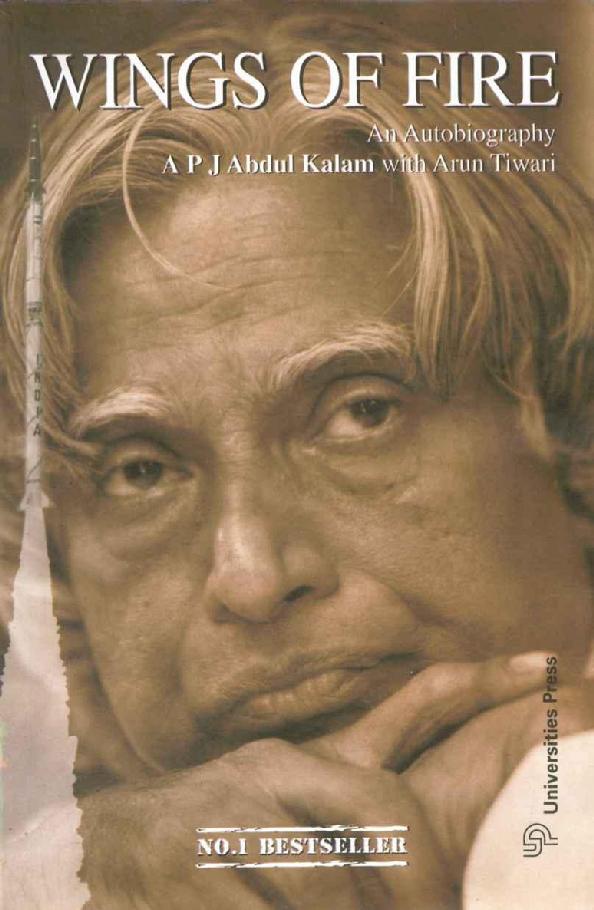
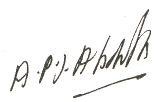 WINGS OF FIREAn AutobiographyAVUL PAKIR JAINULABDEEN ABDUL KALAM has come to personal y represent to many of his countrymen the best aspects of Indian life. Born in 1931, the son of a little educated boatowner in Rameswaram, Tamilnadu, he had an unparal eled career as a defence scientist, culminating in the highest civilian award of India, the Bharat Ratna. As chief of the countrys defence research and development programme, Kalam demonstrated the great potential for dynamism and innovation that existed in seemingly moribund research establishments. This is the story of Kalams rise from obscurity and his personal and professional struggles, as wel as the story of Agni, Prithvi,Akash, Trishul a n d Nag - missiles that have become household names in India and that have raised the nation to the level of a missile power of international recokoning. At the same time as he has helped create Indias awesome weaponry, Kalam has maintained the ascetic rigour of his personal life, working 18 hours a day and practicing the veena. With characteristic modesty, Kalam ascribes the greatness of his achievement to the influence of his teachers and mentors.
WINGS OF FIREAn AutobiographyAVUL PAKIR JAINULABDEEN ABDUL KALAM has come to personal y represent to many of his countrymen the best aspects of Indian life. Born in 1931, the son of a little educated boatowner in Rameswaram, Tamilnadu, he had an unparal eled career as a defence scientist, culminating in the highest civilian award of India, the Bharat Ratna. As chief of the countrys defence research and development programme, Kalam demonstrated the great potential for dynamism and innovation that existed in seemingly moribund research establishments. This is the story of Kalams rise from obscurity and his personal and professional struggles, as wel as the story of Agni, Prithvi,Akash, Trishul a n d Nag - missiles that have become household names in India and that have raised the nation to the level of a missile power of international recokoning. At the same time as he has helped create Indias awesome weaponry, Kalam has maintained the ascetic rigour of his personal life, working 18 hours a day and practicing the veena. With characteristic modesty, Kalam ascribes the greatness of his achievement to the influence of his teachers and mentors.
He describes the struggles of his boyhood and youth, bringing alive everyday life in a smal town in South India and the inspirational role of educators. He describes the role of visionary Indian scientists, such as Dr Vikram Sarabhai, and of the creation of a coordinated network of research institutions. This is also the saga of independent Indias struggle for technological self sufficiency and defensive autonomy a story as much about politics, domestic and international, as it is about science. Arun Tiwari worked under Dr APJ Abdul Kalam for over a decade in the Defence Research and Development Laboratory (DRDL), Hyderabad. He is currently Director, Cardiovascular Technology Institute, Hyderabad, where he is pursuing Dr Kalams vision of developing cost-effective medical devices using indigenous defence technology. Dr Kalam is now Indias President.
He was elected to Indias office by a huge majority in 2002. To the memory of my parentsMy Mother Sea waves, golden sand, pilgrims faith, Rameswaram Mosque Street, al merge into one, My Mother! You come to me like heavens caring arms. I remember the war days when life was chal enge and toil Miles to walk, hours before sunrise, Walking to take lessons from the saintly teacher near the temple. Again miles to the Arab teaching school, Climb sandy hil s to Railway Station Road, Col ect, distribute newspapers to temple city citizens, Few hours after sunrise, going to school. Evening, business time before study at night. Al this pain of a young boy, My Mother you transformed into pious strength With kneeling and bowing five times For the Grace of the Almighty only, My Mother.
Your strong piety is your childrens strength, You always shared your best with whoever needed the most, You always gave, and gave with faith in Him. I stil remember the day when I was ten, Sleeping on your lap to the envy of my elder brothers and sisters It was ful moon night, my world only you knew Mother! My Mother! When at midnight I woke with tears fal ing on my knee You knew the pain of your child, My Mother. Your caring hands, tenderly removing the pain Your love, your care, your faith gave me strength To face the world without fear and with His strength. We wil meet again on the great Judgement Day, My Mother! APJ Abdul KalamContentsPreface
Acknowledgements Introduction
ORIENTATION
CREATION PROPITIATION CONTEMPLATION Epilogue
Preface
I
have worked under Dr APJ Abdul Kalam for over a decade. This might seem to disqualify me as his biographer, and I certainly had no notion of being one. One day, while speaking to him, I asked him if he had a message for young Indians.
His message fascinated me. Later, I mustered the courage to ask him about his recol ections so that I could pen them down before they were buried irretrievably under the sands of time. We had a long series of sittings late into the night and early under the fading stars of dawnal somehow stolen from his very busy schedule of eighteen hours a day. The profundity and range of his ideas mesmerized me. He had tremendous vitality and obviously received immense pleasure from the world of ideas. His conversation was not always easy to fol ow, but was always fresh and stimulating.
There were complexities, subtleties, and intriguing metaphors and subplots in his narrative, but gradual y the unfolding of his bril iant mind took the form of a continuous discourse. When I sat down to write this book, I felt that it required greater skil s than I possessed. But realising the importance of this task and regarding it an honour to have been permitted to attempt it, I prayed earnestly for the courage and calibre to complete it. This book is written for the ordinary people of India for whom Dr Kalam has an immense affection, and of whom Dr Kalam is certainly one. He has an intuitive rapport with the humblest and simplest people, an indication of his own simplicity and innate spirituality. For myself, writing this book has been like a pilgrimage.
Through Dr Kalam, I was blessed with the revelation that the real joy of living can be found in only one wayin ones communion with an eternal source of hidden knowledge within oneselfwhich each individual is bidden to seek and find for himself or herself. Many of you may never meet Dr Kalam in person, but I hope you wil enjoy his company through this book, and that he wil become your spiritual friend. I could include in this book only a few incidents among the many narrated to me by Dr Kalam. In fact, this book provides only a thumbnail sketch of Dr Kalams life. It is quite possible that certain important incidents have been inadvertently dropped and that the contribution of some individuals to the projects co-ordinated by Dr Kalam has gone unrecorded. Since a quarter-century of professional life separates me from Dr Kalam, some important issues might also have remained unrecorded or have been distorted.
I am solely responsible for such shortcomings, which are, of course, completely unintentional. Arun Tiwari
Acknowledgements Introduction
I
wish to express my gratitude to al the people involved in the writing of this book, especial y Mr YS Rajan, Mr A Sivathanu Pil ai, Mr RN Agarwal, Mr Prahlada, Mr KVSS Prasada Rao and Dr SK Salwan, who were very generous in sharing their time and knowledge with me. I am thankful to Prof. KAV Pandalai and Mr R Swaminathan, for critical reviews of the text. I thank Dr B Soma Raju for his tangible, but always unspoken support, for this project. My sincere thanks go to my wife and unsparing critic, Dr Anjana Tiwari, for her tough comments, accompanied with her gentle support.
It has been a pleasure to work with Universities Press, and the cooperation of the editorial and production staff is much appreciated. There are many fine people, such as the photographer Mr. Prabhu, who have selflessly enriched me and this book in ways beyond measure. I thank them al . And final y, my deepest gratitude to my sons, Aseem and Amol for their unfailing emotional support during the writing, and because I seek in them that attitude towards life which Dr Kalam admired, and wanted this work to reflect.
Next page
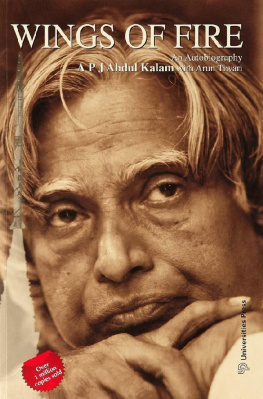

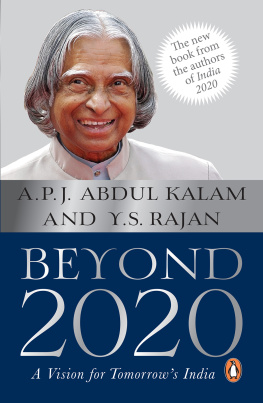
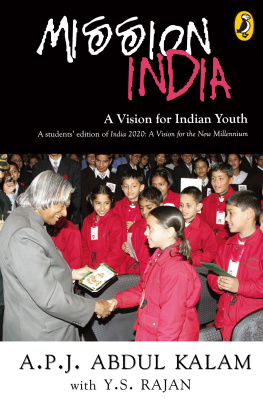
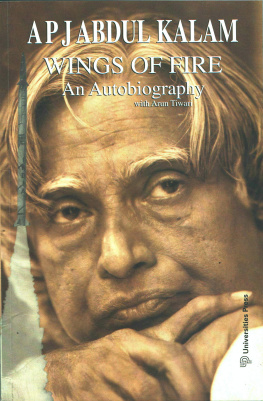
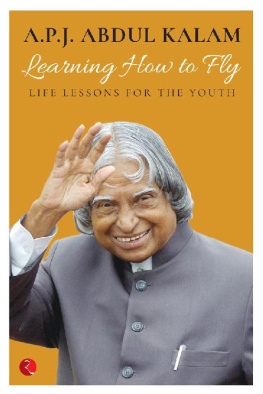
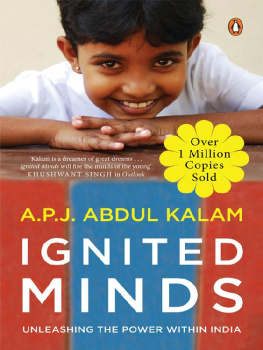
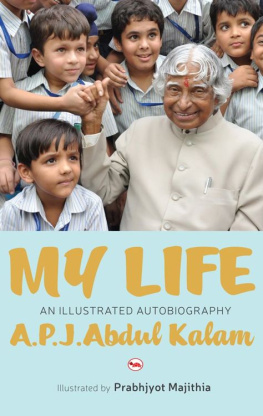
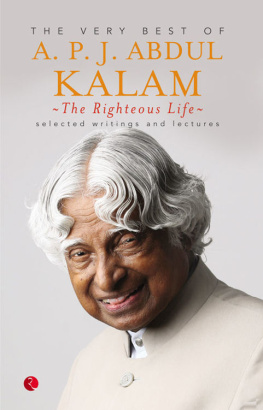
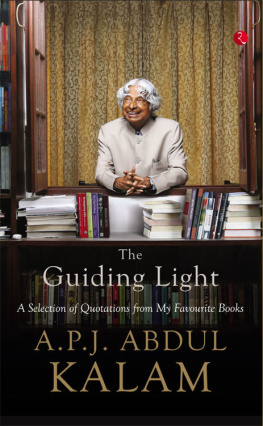
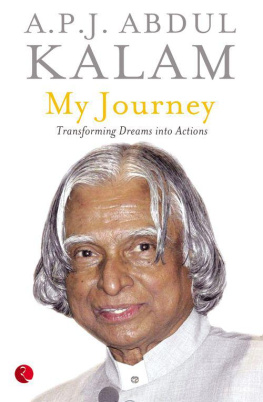


 WINGS OF FIREAn AutobiographyAVUL PAKIR JAINULABDEEN ABDUL KALAM has come to personal y represent to many of his countrymen the best aspects of Indian life. Born in 1931, the son of a little educated boatowner in Rameswaram, Tamilnadu, he had an unparal eled career as a defence scientist, culminating in the highest civilian award of India, the Bharat Ratna. As chief of the countrys defence research and development programme, Kalam demonstrated the great potential for dynamism and innovation that existed in seemingly moribund research establishments. This is the story of Kalams rise from obscurity and his personal and professional struggles, as wel as the story of Agni, Prithvi,Akash, Trishul a n d Nag - missiles that have become household names in India and that have raised the nation to the level of a missile power of international recokoning. At the same time as he has helped create Indias awesome weaponry, Kalam has maintained the ascetic rigour of his personal life, working 18 hours a day and practicing the veena. With characteristic modesty, Kalam ascribes the greatness of his achievement to the influence of his teachers and mentors.
WINGS OF FIREAn AutobiographyAVUL PAKIR JAINULABDEEN ABDUL KALAM has come to personal y represent to many of his countrymen the best aspects of Indian life. Born in 1931, the son of a little educated boatowner in Rameswaram, Tamilnadu, he had an unparal eled career as a defence scientist, culminating in the highest civilian award of India, the Bharat Ratna. As chief of the countrys defence research and development programme, Kalam demonstrated the great potential for dynamism and innovation that existed in seemingly moribund research establishments. This is the story of Kalams rise from obscurity and his personal and professional struggles, as wel as the story of Agni, Prithvi,Akash, Trishul a n d Nag - missiles that have become household names in India and that have raised the nation to the level of a missile power of international recokoning. At the same time as he has helped create Indias awesome weaponry, Kalam has maintained the ascetic rigour of his personal life, working 18 hours a day and practicing the veena. With characteristic modesty, Kalam ascribes the greatness of his achievement to the influence of his teachers and mentors.